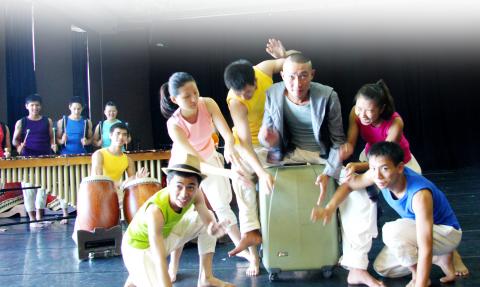Blooming Enlightenment (花蕊渡河) by the U-Theater group (優人神鼓) proved an enormous success at the Taipei International Flora Expo (台北國際花博) last year. The original 40-minute performance has since been heavily reworked and expanded (it will run around 70 minutes) to create a new show featuring extensive input from U-Theater’s youth contingent, mostly in their late teens and early 20s.
Leo Fu (傅祺棠), a spokesperson for U-Theater, said that Blooming Enlightenment would be the last new production prior to the group embarking on a three-year hiatus. Fu said that founder Liu Ruo-yu (劉若瑀) wants to slow down the frantic cycle of creation and performance, and take a breather to refresh its creative juices.
At the same time, this new production is a celebration of the last decade or so of performance and training, taking young members of the theater group, many who joined educational programs run by U-Theater as children, onto the stage of Taiwan’s foremost performance venues.

Photos courtesy of U-theater
“U-Theater has been cultivating young performers over the last decade. Now that we (the older generation of performers) are becoming weary of our heavy performance schedule, the young performers are there to pick up the burden and take a leading role,” Liu said in a statement.
Blooming Enlightenment has just completed two preliminary shows in Yuanlin and Chiayi, which proved very popular despite the many departures from U-Theater’s usual performance style. “We were very nervous about this production,” Fu said, “since we had no idea what the audience response would be like. But the audience was really positive, with good ticket sales and an engaging post-performance Q&A.”
The new production looks very different from what we have come to expect from U-Theater. There is a lot more color, a radical move away from U-Theater’s preference for an earthy palette, and the mood of youthful vitality is also a contrast to the often somber intensity of U-Theater performances. The otherworldly abstractions that serve the focus of the group’s expressive efforts are also filled out with a more accessible storyline.
The concept for the original show — a wanderer’s observation of a wild flower from bud to dissolution and his realization of the forces that drive the cycle of life — was taken from a five character haiku. It has now been further expanded to include a group of student backpackers who stop to rest at a temple, meet the wanderer and learn from him.
The youth contingent are not only performers, but have played an active role in the creative process for the new production, from composition through to presentation. According to U-Theater, this is an attempt to showcase the creativity and youthful exuberance of the younger generation, but also to create a more lighthearted and less constrained musical format in which to explore complex, even mystical issues.
The participation of the younger members of U-Theater, many of whom are currently studying performance art at college, has led to the incorporation of many unexpected elements in this production, reflecting their exposure to international musical culture. “You would not expect to see a xylophone or glockenspiel in a U-Theater production, but these instruments, among others, have been added, making the musical texture much more varied,” Fu said.
“At heart, the spirit of U-Theater remains the same,” Fu said. “It’s just that the presentation has changed, and we hope that this will provide more avenues to gain a deeper understanding of the U-Theater message.”

On April 26, The Lancet published a letter from two doctors at Taichung-based China Medical University Hospital (CMUH) warning that “Taiwan’s Health Care System is on the Brink of Collapse.” The authors said that “Years of policy inaction and mismanagement of resources have led to the National Health Insurance system operating under unsustainable conditions.” The pushback was immediate. Errors in the paper were quickly identified and publicized, to discredit the authors (the hospital apologized). CNA reported that CMUH said the letter described Taiwan in 2021 as having 62 nurses per 10,000 people, when the correct number was 78 nurses per 10,000

As we live longer, our risk of cognitive impairment is increasing. How can we delay the onset of symptoms? Do we have to give up every indulgence or can small changes make a difference? We asked neurologists for tips on how to keep our brains healthy for life. TAKE CARE OF YOUR HEALTH “All of the sensible things that apply to bodily health apply to brain health,” says Suzanne O’Sullivan, a consultant in neurology at the National Hospital for Neurology and Neurosurgery in London, and the author of The Age of Diagnosis. “When you’re 20, you can get away with absolute

May 5 to May 11 What started out as friction between Taiwanese students at Taichung First High School and a Japanese head cook escalated dramatically over the first two weeks of May 1927. It began on April 30 when the cook’s wife knew that lotus starch used in that night’s dinner had rat feces in it, but failed to inform staff until the meal was already prepared. The students believed that her silence was intentional, and filed a complaint. The school’s Japanese administrators sided with the cook’s family, dismissing the students as troublemakers and clamping down on their freedoms — with

As Donald Trump’s executive order in March led to the shuttering of Voice of America (VOA) — the global broadcaster whose roots date back to the fight against Nazi propaganda — he quickly attracted support from figures not used to aligning themselves with any US administration. Trump had ordered the US Agency for Global Media, the federal agency that funds VOA and other groups promoting independent journalism overseas, to be “eliminated to the maximum extent consistent with applicable law.” The decision suddenly halted programming in 49 languages to more than 425 million people. In Moscow, Margarita Simonyan, the hardline editor-in-chief of the